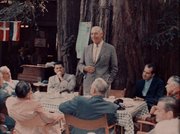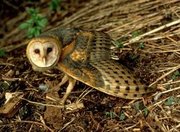Owl
From Plastic Tub
|
Owl n. 1. Nocturnal bird of prey. 2. A coin first produced by the Athenian tyrant Peisistratus, using silver from the Laurion mines 25 miles south of Athens, in 546 BCE. 3. In AA parlance an owl is an elder who is no longer sympathetic with the movement. UsageJorge Suarez once wrote about an encounter he had with a barn owl on a ranch in Venezuela: "Las chuetas malabuenas mirando la noche y torciendo el cogote en mil puertas giratorias. Las tres al mismo tiempo, gritaban: "carne carne" y luego volaban en un vuelo recortado." -- Journal excerpt, 1940. ExtrapolationThe owl has a long and storied history as a popular and resonant symbol. During the Classical Period, for example, anyone could tell you that the owl was the symbol of Athena, Goddess of Wisdom and patron of Athens. Today, the owl is still a popular symbol of sagacity and even school children know that the Owl, or Silver Tetradrachm of Ancient Athens, was the Dollar of its day: universally recognized and accepted currency. Perhaps the most intriguing use of the owl as a symbol in contemporary times is the Bohemian Club. Founded in 1872 by men nostalgiac for East Coast refinement, it has become a bastion of the rich and powerful men of the conservative elite. Every year they hold a retreat in Sonoma County at a place called Bohemian Grove, where the high-jinks seem to be a cross between the Council for Foreign Relations and Animal House. Just in case you think the pedigree of the Grove guests may be over-rated, take a look at just four examples: Henry Kissinger, George Shultz, George Bush and William Casey. And who's that in the picture featured on this page? Why, it's Ricard Nixon and Ronald Reagan. Important speeches known as "Lakeside Talks" are given by these prestigious guests and important foreign policy decisions are discussed and some would say, actually formulated at the Grove. Employees of the Grove have said that all this occurs against a backdrop of heavy drinking and sexual abandon. Perhaps the most bizarre activity at the Grove is a ritual called the "Cremation of Care." On the first Saturday of their encampment men in red, hooded robes enact a short play during which they burn a coffin called "Dull Care" in front of an "altar" in the form of a owl, forty feet tall. According to the Bohemian Grove Action Network, "Their rationale is that they carry the cares of the world around on their shoulders and they need a symbolic ritual in order to put it down and enjoy their holiday." With such a heady mixture of powerful men, strange rites and orgiastic behavior, is it any wonder that the Grove has seized the attention of conspiracy theorists? Doesn't it all sound so very Skull and Bones? Some Christian writers have seized upon the Grove Rites and linked the owl to Molech, but this appears to be entirely unsubstantiated. Furthermore, Nixon is said to have disparaged the Grove as "the most faggy goddamned thing you could ever imagine." Some assert that despite the elite visitors, the bulk of the Bohemians are in fact lovers of art and high culture. The fact remains, however, that strange things are going on at Bohemian Grove, and thus lends our little rodent-eating friend the owl an even greater air of mystery than he has been traditionally cloaked in. Non Canonical TextMolechian outer soul and animal ritual rites concerning the owl predate the Athenian Tradition by quite some 3000 years and supplied quite some heft in the cultural canon of the times. in the Molechian system the owl often exemplified itself in female forms, often contrary to its fellow nocturn the bat which completes the dualism by exemplifying the masculine. The owl's heritage is archetypicaly complex. The peculiar habitats of owls (trees, crevices, barns, stolen nests etc al) provided the differant scenarios for the many later opposing symbols and legends of the owl. (Hartman press 1933.) The Molechian owl traditions languished and ultimatley succumbed early in the Athenian Epoch. The transistional period for myths is a dangerous pass in the sequencing of a new cultural identity. This diruption in the continium is a ripe era when the older myths are attacked and thier meanings usurped for assimilation or degraded into esoterica. There is remarable evedince that the owl-witch-bat phenomenon of the Lamb epoch is bred from these cthonic origins. While the Athenian cults attributed the owl with features more regal, more wise, attributing it with stoic wisdom and despotic tyranny the Molechians maitained the prevailing traditions and thus thiers was contaminated. This fracture explains the myriad forms of the owl trditions. (Wunderkidd from the Dawn of...series) NotesNote 1: The Mormo Cults reportedly install many Owlian Cantos in thier initiational rituals and at times have brandished the white owl on some of thier literature. Note 2: The Molechian cults believed if you ate the eyes of the owl you could see in the dark and the and call of the night owl is a major component of many of theier birth and death rituals. Note 3: The Chocu cults of today as usual prefer the grey area inbetweenf the primal balance of the Mormo-Athens Axis. For instance the owl is regarded neither benevenentoly or it obverse by the Chocuthiests but is rather treated as a symptom of mans desire to anthropomorphize and synergize the beasts that would most well represent themselves. See Also |
DesiderataXenophon Aliokrate was sometimes called the "Owl" by his Bulgarian Connections. Mr. Korea had a pet owl named "Lucky." A group of owls is--oddly enough--called a parliament. Owls can hunt in pitch black darkness navigating by sound |


